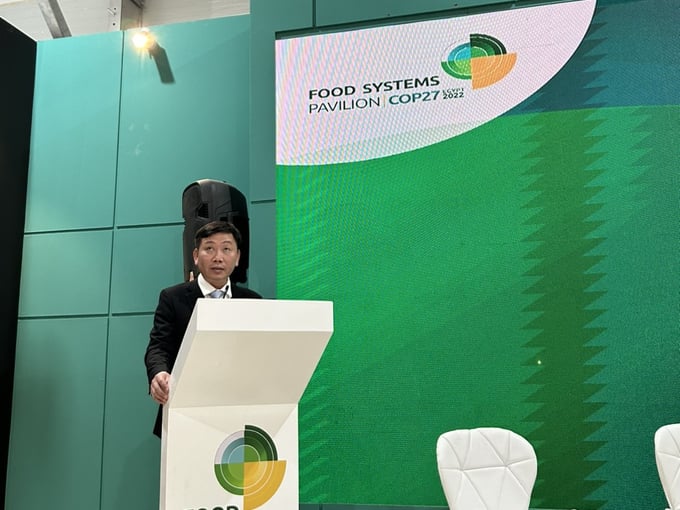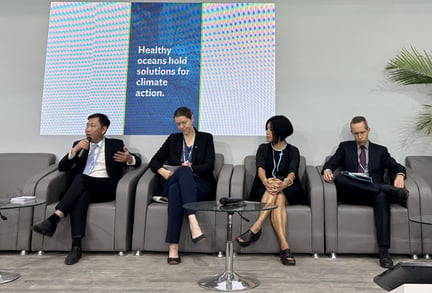November 26, 2025 | 06:42 GMT +7
November 26, 2025 | 06:42 GMT +7
Hotline: 0913.378.918
November 26, 2025 | 06:42 GMT +7
Hotline: 0913.378.918
On November 6, 2022, the 27th Conference of the Parties to the United Nations Framework Convention on Climate Change (COP27) opened in Sharm El-Sheikh, Egypt, with over 120 world leaders and 40,000 delegates in attendance.
The comprehensive message of COP27 is "Together for implementation," which emphasizes the 2022 priorities that require action, the transformation of commitments and declarations into practical outcomes and actions, and the transformation of commitments and declarations into practical outcomes and actions. The subjects include climatic finance, research and technology, decarbonization, agriculture, water resources, community responses to climate change (CC), biodiversity, and response strategies.
In his opening remarks, Mr. Sameh Shoukry, the president of COP27, urged governments to address new concerns pertaining to energy, food, and energy transformation swiftly.
A report published by UN Climate Change ahead of COP27 shows that whilst countries are bending the curve of global greenhouse gas emissions downward, efforts remain insufficient to limit global temperature rise to 1.5 degrees Celsius by the end of the century.
The Executive Secretary of the United Nations Framework Convention on Climate Change stressed the responsibilities of all governments and individuals for the execution of commitments.
In his opening address, he asked governments to focus on three critical areas at COP27. The first is a transformational shift to the implementation of the Paris Agreement and putting negotiations into concrete actions. The second is cementing progress on the critical workstreams of mitigation, adaptation, finance, and loss and damage while stepping up finance notably to tackle the impacts of climate change. The third is enhancing the delivery of the principles of transparency and accountability throughout the UN Climate Change process.

Mr. Nguyen Do Anh Tuan delivered the opening speech of the event "Strengthening the resilience of the food system" organized by Clim-Eat.
Under the direction of the Director of the International Cooperation Department Nguyen Do Anh Tuan, the MARD delegation attends COP27. It met with a number of partners to encourage collaboration in sustainable development, green growth, low-carbon agriculture, climate change response, forest recovery and development, and the conservation of biodiversity.
Mr. Nguyen Do Anh Tuan was invited to deliver the opening remarks at the Clim-Eat panel on "Increasing Food System Resilience." The topic covered the vulnerable and priority groups as subjects that require smart solutions, which meet local conditions, the encouragement of private sector investment in the agricultural production chain, and the strengthening of South-South cooperation for information sharing.
He also emphasized the need for "joint action" to address the consequences of the Covid-19 pandemic, crises in food, feed, energy, agricultural, and financial inputs, and affirmed Vietnam's desire to work with all partners to build and develop a transparent, responsible, and sustainable food system so that "no one is left behind."
Additionally, he reported that Vietnam would hold the fourth Global Conference on Sustainable Food Systems Programme in Hanoi from April 24 to 28, 2023.
In addition, the delegation actively participated in the event hosted by the Asian Development Bank with the theme "Adapting to climate change to improve coastal resilience and developing blue economy: Healthy oceans hold climate action solutions."

Mr. Nguyen Do Anh Tuan (far left) speaks at the event "Adapting to climate change to improve coastal resilience and developing blue economy: Healthy oceans hold climate action solutions" organized by the Asian Development Bank.
As a panelist, Mr. Nguyen Do Anh Tuan discussed the problems, challenges, and top priorities for enhancing climate change resilience and coastal region resilience for sustainable growth. Vietnam, which has a coastline of over 3,200 kilometers and coastal provinces and towns that contribute about half of the country's GDP, pays special attention to enhancing the coastal area's resilience to climate change and natural disasters.
It focuses on strengthening the coastal area's ability to respond to climate change, restoring and developing the coastal mangrove protection forest system, encouraging co-management of sustainable forest and fisheries resources, improving the capacity to forecast, warn of natural disasters, and inform people in a timely manner, providing policies to encourage and provide financial support for the implementation of synchronized structural/non-structural solutions for economic development, and enacting a number of other measures.
The Bank of Asia has announced the development of a Blue Finance Hub to assist coastal communities in enhancing their resilience, transforming people's livelihoods, and protecting marine ecosystems for the benefit of all countries. Vietnam is a priority nation to receive assistance from this Fund.
Translated by Linh Linh

(VAN) Deputy Minister Nguyen Quoc Tri emphasized the determination to prevent violations at CoP20, sharing enforcement results and commitments to strengthen cooperation with the international community in the coming period.

(VAN) In addition to strengthening the relationship between schools and enterprises, the Aus4Skills project expands opportunities for female students and people with disabilities to work in the transport and logistics sector.

(VAN) Nghe An is preparing policy, technical, and resource steps to participate in the forest carbon credit market.
/2025/11/25/1648-2-110733_532.jpg)
(VAN) From 2011 to 2023, Ca Mau province lost approximately 6,200 ha of coastal land and protection forests due to erosion, threatening many residential areas, infrastructure facilities, and production zones.

(VAN) Quang Ngai holds strong potential for carbon credits but needs a clear legal and policy framework to secure sustainable revenue from this resource.

(VAN) With its diverse ecosystem, Phu Quoc National Park plays a vital role in environmental protection and biodiversity conservation and serves as the core zone of the Kien Giang World Biosphere Reserve.

(VAN) Cooperation activities under the Aus4Skills program focus on: logistics professional development, competency-based training and assessment (CBTA), leadership innovation, and digitalization.